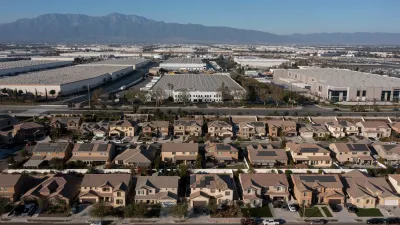What’s good for the planet is good for the economy, according to a recent study published by the Lincoln Institute of Land Policy.

Anthony Flint writes for the Lincoln Institute of Land Policy to explain the findings of a recent working paper, “Building the Breathable City.” The study, authored by Alexander Lord, Erwin van der Krabben, and Guanpeng Dong, documents the connection between air quality and land values in China.
“The kind of analysis done in Zhengzhou is important because it directly links environmental improvements to increasing value. Demonstrating that link is crucial in making the case for a financial tool that could be essential for addressing the climate crisis: land value capture," writes Flint.
The article provides more detail about land value capture as an emerging tool for municipalities and countries to generate revenue for the adaptation and mitigation investments that will be required of climate change. There is a growing list of projects that have successfully delivered economic benefit by investing in climate resilience and environmental sustainability, as documented by Flint, including projects in Quito, Seattle, Philadelphia, Buenos Aires, Tokyo, and Boston.
Still, the emerging evidence in support of an environmental approach to economic development has a long way to go to become the status quo. According to Flint, “many barriers must be overcome to make land value capture work. National urban development laws need to be reformed to authorize more local governments to mobilize land value increments and permit own-source revenue. Around the world, a pressing need remains to improve institutional capacity, good governance, land controls, and tenure systems.”
The Lincoln Institute of Land Policy has also created a Land-Based Climate Finance page that explains how municipalities can leverage capital stock is embedded in land, buildings, and infrastructure to generate revenue streams for climate adaptation, mitigation, and resilience.
FULL STORY: Return on Investment: Research Links Climate Action with Land and Property Value Increases

Alabama: Trump Terminates Settlements for Black Communities Harmed By Raw Sewage
Trump deemed the landmark civil rights agreement “illegal DEI and environmental justice policy.”

Planetizen Federal Action Tracker
A weekly monitor of how Trump’s orders and actions are impacting planners and planning in America.

The 120 Year Old Tiny Home Villages That Sheltered San Francisco’s Earthquake Refugees
More than a century ago, San Francisco mobilized to house thousands of residents displaced by the 1906 earthquake. Could their strategy offer a model for the present?

Rural Missouri Transit Service Could Lose State Funding
OATS Transit offers low-cost rides to primarily elderly rural residents with little or no access to other transportation options.

Opinion: California’s SB 79 Would Improve Housing Affordability and Transit Access
A proposed bill would legalize transit-oriented development statewide.

Record Temperatures Prompt Push for Environmental Justice Bills
Nevada legislators are proposing laws that would mandate heat mitigation measures to protect residents from the impacts of extreme heat.
Urban Design for Planners 1: Software Tools
This six-course series explores essential urban design concepts using open source software and equips planners with the tools they need to participate fully in the urban design process.
Planning for Universal Design
Learn the tools for implementing Universal Design in planning regulations.
Clanton & Associates, Inc.
Jessamine County Fiscal Court
Institute for Housing and Urban Development Studies (IHS)
City of Grandview
Harvard GSD Executive Education
Toledo-Lucas County Plan Commissions
Salt Lake City
NYU Wagner Graduate School of Public Service





























